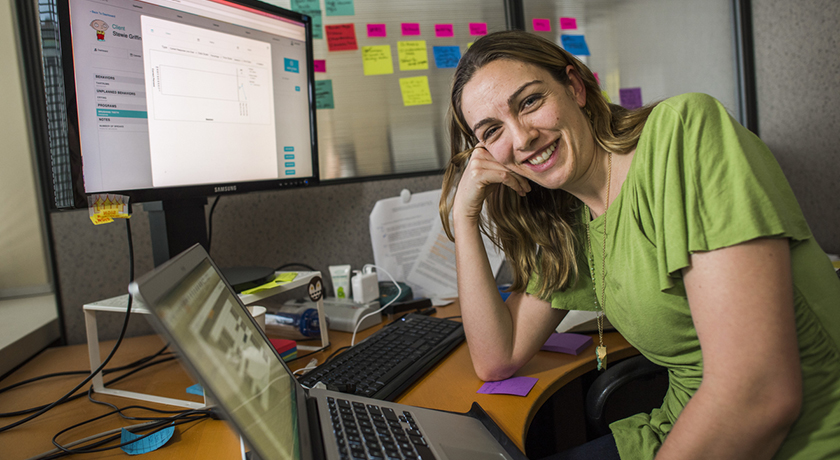
"All of my experiences in collaborating and working with other scientists gave me insights into working with teams of really smart people, all with different expertise, and helping them communicate to become clear on what we're moving toward, and how we're going to get there. " -Carley Piatt
Carley Piatt says the only way to make inroads into the complexity of learning disorders in children is to open up the questions to the widest perspectives. That's her advice to her graduating class in the University of Alberta's Faculty of Science-and she is the most compelling example of the significance of that philosophy.
Piatt, who has just earned her PhD in psychology, says she came to the U of A from Colorado because she always had questions about learning and development that were off the beaten path in cognitive psychology.
"When I was starting my doctoral studies, I had offers from several universities. But usually schools stream you straight onto a predictable path, which is essentially your supervisor's research. U of A was like finding the freedom of the Wild West, because I was able to shape my own research questions, with the strength of two supervisors in two different disciplines," says Piatt.
Piatt's two supervisors, Jeff Bisanz and Joanne Volden, provided perspectives from psychology and rehabilitation medicine to put Piatt on an unusual path for a psychology student. Bisanz, a leading researcher in the field of children's cognitive development and mathematical thinking, and Volden, who studies language processing in autism, helped her develop an uncommon approach to autism spectrum disorder (ASD) and learning outcomes.
"My training and experiences with Jeff and Joanne taught me to carve out a problem space while thinking about the impact on different stakeholders, define the boundaries, ask insightful questions, define measurable outcomes, analyze and synthesize data, and then share the results in as meaningful a way as possible," she says.
It's a learning problem-and a data problem
The second part of Piatt's personal philosophy was instrumental to her success in landing a research and development fellowship two weeks after finishing her PhD. This part of her philosophy advocates that students should tell everyone what they're working on and the questions they're considering. So far, it's working out well for her. After telling a friend about her research and her vision to create scalable mechanisms for knowledge sharing, that friend introduced her to a local software company focused on supporting intervention protocols for ASD.
The company, Technology North, is driven by the deeply personal vision of CEO Ling Huang, whose son has ASD. Joining the company as a subject expert on a research and development fellowship-funded in part by Alberta Innovates - Technology Futures-Piatt will advocate advancing family-centred services by providing her deep knowledge of what's known about how children with ASD process and learn information. In consultation with partners, clients and clinicians, she will help integrate their feedback for better product design.
"My experience as a developmental science researcher places me in a unique position to act as a bridge between stakeholders from multiple sectors interested in partnering to find the best ways to share skills, programs, interventions, ideas and valuable content."
A scientific expedition into the human mind
But to understand the complexity of the task before her, Piatt describes a challenging research frontier where the ability to manage the volumes of test results and data has made it impossible to assess the value of a given protocol for ASD-until now.
"As early as 1977, behavioural analysts envisioned a way to map scenarios for broadly training and helping children generalize knowledge. But the reality of cataloguing and digesting the massive volumes of data was, at the time, intractable," she explains. "This is where the Technology North project could be a game-changer. If we can get it right, we can leapfrog over the computational limitations that have held us back and give interventionists and trainers the opportunity to tailor each program, in real time."
A systems approach for better outcomes
The platform, TNActiveCare, takes advantage of data and decision-making to reinforce and teach to goal-specific outcomes using mobile devices. It is already in use in treatment centres in Edmonton, Winnipeg and Utah, and the company is also working on developing a scalable model called masBility that could be used for employing adults with disabilities.
Piatt also points out that Huang was clear about the need for more transparency for parents and caregivers, to strengthen the systems approach to build stronger outcomes so families, caregivers and treatment providers can also contribute and reinforce programming and interventions.
Looking ahead: mobilizing knowledge
Piatt says her long-term career goals are to affect large-scale, impactful change, and she's well on her way. To do this, Piatt says this bi-directionality of knowledge, where everyone in the system has valuable insights to contribute, is part of her big future vision.
"My experience as a U of A student-which included participating in the Canadian Institutes of Health Research's autism research training program at McGill every summer for three years-gave me solid training in just how complex and nuanced autism spectrum disorders are, underscoring my belief that supporting individuals and families is best served by multidisciplinary and cross-sectorial collaborations."
Advice to students
As a final word of advice to her fellow students who are just starting out, Piatt points out that psychology is a complementary discipline to a lot of other areas of study. This is true of many disciplines, in fact. "I would encourage people to take a number of courses, beyond the intro level, in another discipline that interests them, no matter how unlikely or tenuous the connection might first appear.
"Innovation, new ways of thinking, new scientific disciplines, the ability to carve out jobs that aren't posted on typical job boards, all come from experience and exposure with different ways of thinking about problems."
More information:
Carley Piatt research and teaching page
Alberta Innovates r&D Associate fellowship